Baby kittens have an undeniable charm that melts hearts instantly. Their tiny paws, big round eyes, and soft meows make them impossible to resist. Whether they’re playfully pouncing, snuggling into a warm lap, or purring contentedly, their adorable behaviors trigger a deep emotional response in humans. Scientists believe their small size, round features, and delicate movements tap into our natural instincts to nurture and protect, much like a human infant does.
Beyond their cuteness, baby kittens require special care to grow into healthy, happy cats. Understanding their needs—from proper nutrition and socialization to safe play and early development—ensures they thrive. In this guide, we’ll explore what makes kittens so irresistibly cute and provide expert care tips to help you raise them with love and confidence. Whether you’re a first-time kitten parent or an experienced cat lover, this post will give you insights into their adorable world and essential care practices.
The Science Behind Why Baby Kittens Are Adorable
Baby Kittens Eyes: The Windows to Their Cuteness
A baby kitten’s eyes are one of the first things people notice, and they play a huge role in making these tiny felines so irresistibly cute. Their large, round eyes give them an innocent and wide-eyed expression that instantly triggers a nurturing response in humans. Unlike adult cats, baby kittens have an extra level of adorableness because their eyes appear disproportionately big for their small faces. This trait, known as “neoteny,” makes them look more like infants, which naturally attracts human affection.
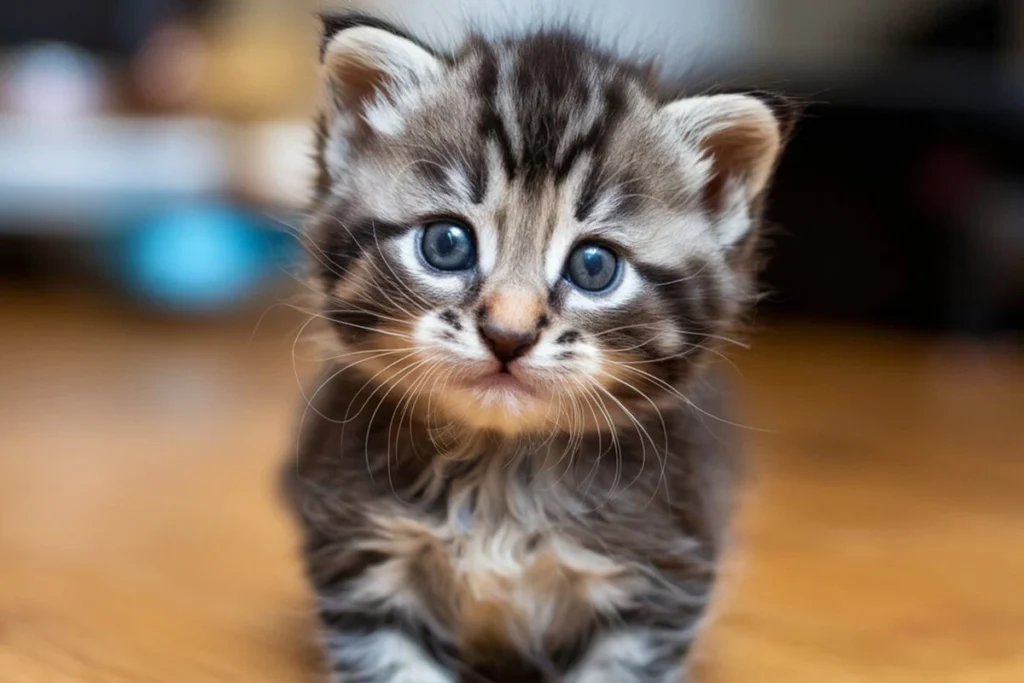
Most baby kittens are born with blue eyes, adding to their angelic and dreamy appearance. This unique feature lasts for the first few weeks of their lives before their permanent eye color develops, which can be green, amber, gold, or even a mix of colors. Their curious gazes, slow blinks, and playful stares make them impossible to resist. Watching a baby kitten explore the world with wide, sparkling eyes makes every moment feel magical. Whether they are following a moving toy, staring at their reflection, or gazing up at their human with love, their expressive eyes create a deep emotional connection.
Tiny Paws and Whiskers: The Ultimate Cuteness Combo
Baby kittens have some of the smallest, most delicate paws, and every little step they take looks like an adorable wobble. Their tiny pink toe beans and soft fur-covered paws make them even more lovable. Watching a baby kitten knead a blanket, paw at their mother for milk, or clumsily pounce on a toy fills any cat lover’s heart with joy. As they grow, their paws become essential tools for exploring, climbing, and playing, but in those early weeks, their soft and fragile nature makes them extra endearing.
Whiskers, though often overlooked, are another reason baby kittens are so cute. These delicate, sensitive hairs frame their tiny faces, making their expressions even more charming. Baby kittens use their whiskers to navigate their surroundings, judge distances, and sense objects nearby. When they twitch their whiskers in excitement or push them forward when investigating something new, they create an expression that makes them look even more curious and sweet. Whiskers also enhance their tiny, round faces, giving them a permanently adorable and inquisitive appearance.
Soft Meowing and Purring: The Sounds of Pure Sweetness
The sounds baby kittens make are just as captivating as their appearance. Their tiny, high-pitched meows melt hearts instantly. Unlike adult cats, who often meow to communicate with humans, baby kittens meow frequently to call for their mother, express hunger, or seek comfort. Their soft cries create an immediate emotional response, making humans want to scoop them up and provide warmth and love.
Purring adds another irresistible layer to a baby kitten’s charm. The gentle vibration of their tiny bodies as they purr creates a sense of warmth and tranquility. When a baby kitten purrs while snuggling in your lap, kneading a soft blanket, or curling up with their littermates, it signals pure contentment. Experts believe purring isn’t just a sign of happiness—it also has calming and healing effects, both for the kitten and for their human companions. The rhythmic sound of a baby kitten’s purr can lower stress, promote relaxation, and strengthen the bond between the kitten and its caregiver.
Every little detail, from a baby kitten’s wide, sparkling eyes to its soft meows and twitching whiskers, contributes to its undeniable cuteness. These features don’t just make them adorable—they create a powerful emotional connection between baby kittens and the humans who love them. Whether watching them play, listening to their gentle purrs, or feeling their tiny paws curl around your finger, the cuteness of baby kittens is something truly special.
Cute Baby Kittens Behaviors That Melt Our Hearts
Playful Kitten Habits: Endless Energy and Adorable Antics
Baby kittens bring endless joy with their playful, energetic nature. They spend a huge part of their waking hours chasing, pouncing, and tumbling over each other. Their curiosity fuels their playful behavior, making even the simplest objects—like a crumpled piece of paper or a dangling string—seem like the most exciting toys in the world.
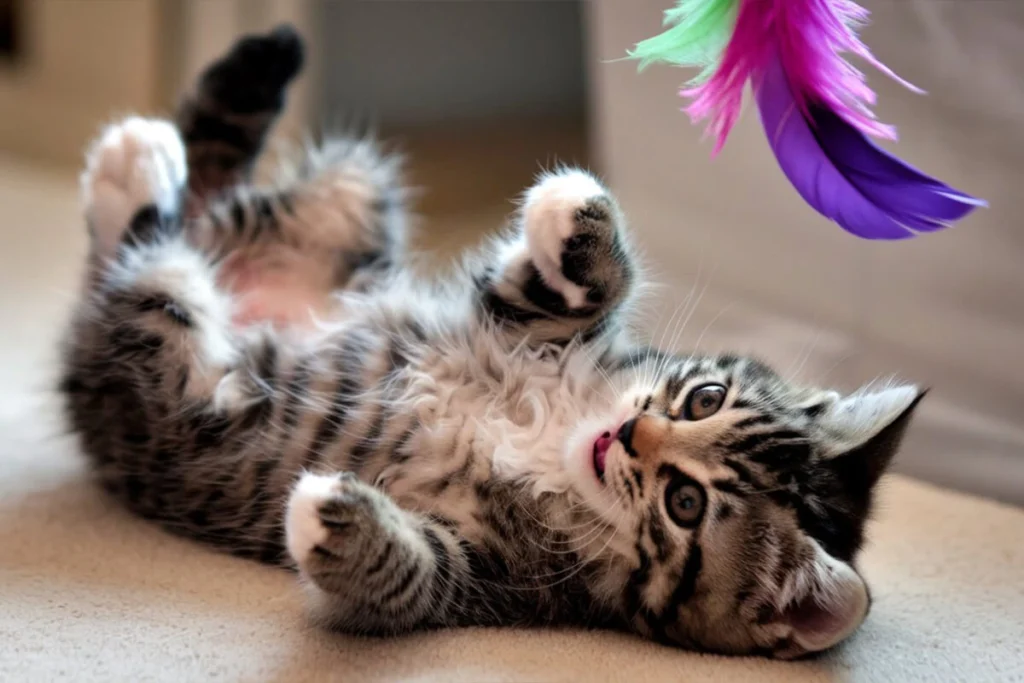
Their play habits aren’t just entertaining; they also help kittens develop essential skills. When a baby kitten crouches low before launching into a playful attack, it’s practicing hunting instincts that would be necessary in the wild. Wrestling with littermates teaches them important social skills, including how to control their claws and bites. A kitten that pounces on a toy or chases its own tail is building coordination and agility, both of which become more refined as they grow.
Baby kittens also love interactive play with their human caregivers. Wiggling a feather wand, rolling a ball across the floor, or offering a small stuffed toy keeps a kitten engaged while strengthening the bond between kitten and owner. Regular play helps a baby kitten burn off energy, reducing unwanted behaviors like biting or climbing furniture. Their playful antics, combined with their tiny size and boundless enthusiasm, make every moment spent with them an absolute delight.
Socializing Baby Kittens: Building Confidence and Trust
The early weeks of a baby kitten’s life shape its personality and behavior. Proper socialization ensures a kitten grows into a confident, friendly, and well-adjusted cat. When kittens interact positively with humans, other animals, and new environments, they learn to feel safe and secure in different situations.
Handling a baby kitten gently from an early age helps it become comfortable with human touch. Petting, holding, and softly speaking to a kitten daily builds trust and deepens the human-animal bond. Letting a kitten explore different textures, sounds, and objects helps it adapt to new experiences without fear. Introducing it to other pets or people in a calm and controlled manner encourages social skills that will benefit the kitten throughout its life.
Socialization also involves teaching kittens appropriate behaviors. When a baby kitten plays too roughly or nibbles on fingers, redirecting it to a toy helps it learn proper play habits. Rewarding a kitten with treats or affection when it behaves well reinforces positive behavior. The more a baby kitten experiences love, kindness, and gentle interaction, the more confident and affectionate it becomes as an adult cat.
Baby Kittens Fur Texture and Grooming: Softness That Begs to Be Touched
Few things feel as comforting as the soft, plush fur of a baby kitten. Their delicate coats, often fluffier than an adult cat’s, add to their irresistible charm. Stroking their silky fur provides a soothing experience, both for the kitten and the person holding it. Each kitten’s fur texture varies depending on breed—some have short, velvety coats, while others, like Maine Coons or Persians, develop longer, fluffier fur that makes them look even more huggable.
Kittens also spend a lot of time grooming, often mimicking their mother’s cleaning habits. Licking their fur keeps it clean and stimulates healthy skin. Watching a tiny kitten struggle to clean its own face with its tiny paws or seeing it bathe a sibling in gentle licks adds another level of cuteness. Grooming isn’t just about cleanliness—it’s also a bonding activity. Mother cats groom their kittens as a sign of affection, and kittens who groom each other strengthen their social connections.
Regular brushing helps maintain a baby kitten’s soft coat and prevents tangles, especially for long-haired breeds. Using a gentle brush introduces kittens to the grooming process early, making it a positive experience rather than a stressful one. It also reduces shedding and keeps their fur looking sleek and healthy. For humans, grooming time offers another chance to bond with a baby kitten, reinforcing trust and making the kitten feel loved.
Every aspect of a baby kitten, from its playful nature to its soft fur and loving social interactions, makes it one of the most adorable and heartwarming creatures in the world. Whether it’s engaging in an energetic play session, cuddling up for affection, or meticulously grooming itself, a baby kitten continues to capture hearts with its cuteness and charm.
How Baby Kittens Develop in Their Early Weeks
Newborn Kitten Development: The First Weeks of Growth and Discovery
A baby kitten experiences rapid changes during its first few weeks of life. At birth, kittens enter the world with their eyes closed, ears folded, and bodies completely dependent on their mother for warmth and nourishment. Their tiny size, soft fur, and delicate movements make them incredibly vulnerable, but their development progresses quickly.
During the first week, baby kittens sleep most of the day, conserving energy for growth. Their mother keeps them warm by snuggling close, since kittens cannot regulate their body temperature on their own. They rely entirely on touch and scent to find their mother and siblings, instinctively kneading their tiny paws against her belly while nursing.
By the second week, baby kittens start to open their eyes, revealing the signature blue color that all newborns share. Though their vision remains blurry, they begin to respond to light and movement. Their ears unfold as well, making them more aware of sounds in their environment. Their wobbly movements start to improve, and they become more active within their nesting area.
In the third and fourth weeks, kittens begin exploring their surroundings. They take their first clumsy steps, experiment with playful interactions, and develop stronger coordination. Their tiny teeth start to emerge, signaling the upcoming transition from a fully milk-based diet to soft solid food. Their personalities also start to shine through, with some kittens appearing more adventurous while others remain extra snuggly and dependent on their mother.
Mother Cat’s Role: The First Teacher and Protector
A mother cat plays the most critical role in a baby kitten’s early survival and development. From the moment her kittens are born, she provides them with warmth, protection, and constant care. She instinctively knows how to position herself so they can nurse comfortably, and she licks them frequently to keep them clean and stimulate digestion. Since newborn kittens cannot urinate or defecate on their own, the mother gently licks their bellies to help them eliminate waste.
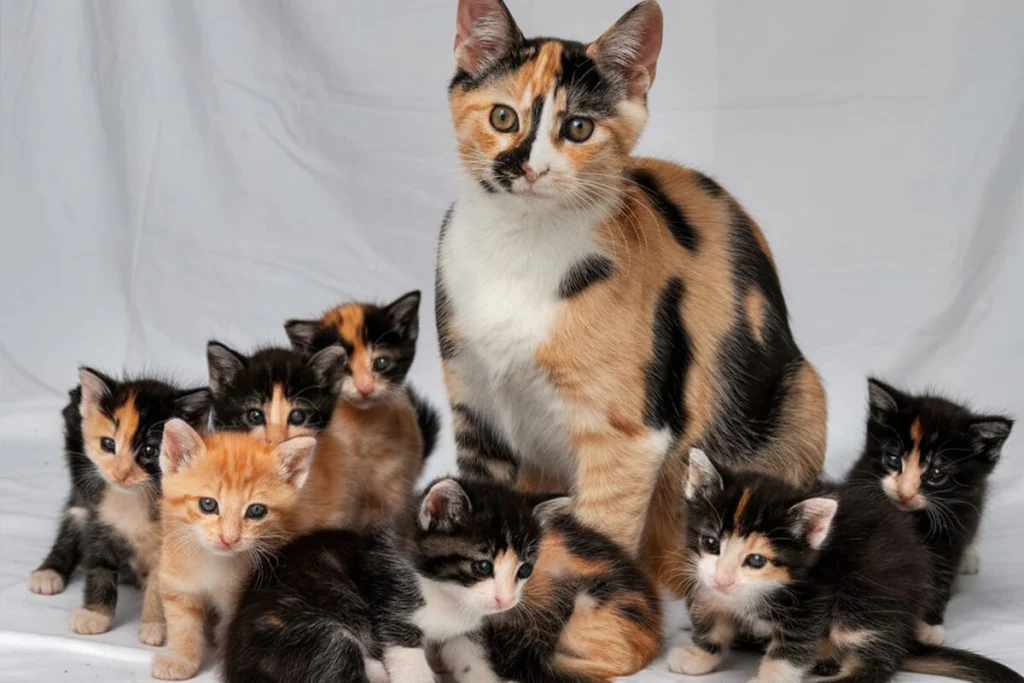
Beyond physical care, the mother cat teaches her kittens essential social skills. She uses gentle nudges, licks, and soft purring to reassure them, creating a strong bond. As the kittens grow, she starts introducing them to the basics of feline behavior. She encourages playtime, teaches them how to groom themselves, and even shows them how to interact with their siblings. When a kitten misbehaves or gets too rough, she corrects it with a firm but gentle paw tap or a warning growl.
Around four to six weeks, the mother cat begins the process of weaning. She gradually reduces nursing time, encouraging her kittens to eat solid food. She also introduces them to basic hunting skills by bringing them small prey or engaging them in play that mimics catching and pouncing. Even though she allows more independence at this stage, she continues to watch over her kittens, ensuring they grow into confident and capable young cats.
Milk Feeding & Weaning: The Transition to Solid Food
A baby kitten depends entirely on its mother’s milk for the first few weeks of life. Mother’s milk provides all the essential nutrients kittens need to grow strong and healthy. It contains antibodies that protect against infections, supports immune system development, and promotes overall well-being. Kittens nurse frequently, sometimes every two to three hours, to satisfy their tiny but growing appetites.
By the third to fourth week, baby kittens start showing interest in solid food. Their teeth begin to emerge, making it possible for them to nibble on soft kitten food. The weaning process happens gradually, with the mother cat guiding them to eat small amounts while still allowing occasional nursing for comfort.
Introducing solid food requires patience. Mixing wet kitten food with warm water or kitten formula helps create a soft texture that’s easy for kittens to lap up. Placing a shallow dish in front of them and letting them explore at their own pace encourages natural curiosity. Some kittens dive right in, while others take a little more time to adjust. Messy eating is part of the learning process, and watching a baby kitten accidentally step in its food or lick its tiny paws clean only adds to its charm.
By eight weeks, most kittens eat solid food exclusively, though some still seek occasional comfort nursing. A balanced diet during this stage ensures strong development, healthy fur, and plenty of energy for their playful adventures. Providing fresh water alongside meals helps them stay hydrated and prepares them for a fully independent diet.
Understanding newborn kitten development, the mother cat’s role, and the milk-to-solid food transition ensures that baby kittens receive the care they need to grow into strong, happy, and well-adjusted cats. Their early weeks shape their future, and the love and attention they receive during this time lay the foundation for a healthy and affectionate companion.
Essential Kitten Care Tips for Raising a Happy, Healthy Kitten
Kitten Health and Nutrition: Building a Strong Foundation for Growth
A baby kitten’s health depends on proper nutrition, regular check-ups, and a clean environment. During the first few weeks of life, kittens receive all the necessary nutrients from their mother’s milk. If a mother cat isn’t available, a high-quality kitten formula provides the essential vitamins, proteins, and fats required for healthy development. Avoid feeding cow’s milk, as it can cause digestive issues.
As kittens grow, their nutritional needs change. By the fourth week, they begin transitioning to soft kitten food, which should be rich in protein, fats, and essential nutrients. High-quality commercial kitten food contains taurine, an important amino acid that supports heart and eye health. Wet food helps keep kittens hydrated, while dry food strengthens their tiny teeth as they start chewing. Providing fresh water at all times encourages good hydration habits.
Regular veterinary check-ups ensure a baby kitten stays healthy. The first visit usually happens around six to eight weeks, when the kitten receives vaccinations and a general health assessment. Deworming protects against intestinal parasites, while flea prevention keeps the kitten’s delicate skin free from irritation. Monitoring weight gain, energy levels, and stool consistency helps detect potential health issues early.
Healthy kittens display bright, clear eyes, soft and shiny fur, and playful energy. They eat regularly, use the litter box properly, and interact with their surroundings with curiosity. Any sudden changes in appetite, behavior, or litter box habits signal a need for veterinary attention. Proper nutrition, preventive care, and a loving environment ensure a baby kitten grows into a strong and happy cat.
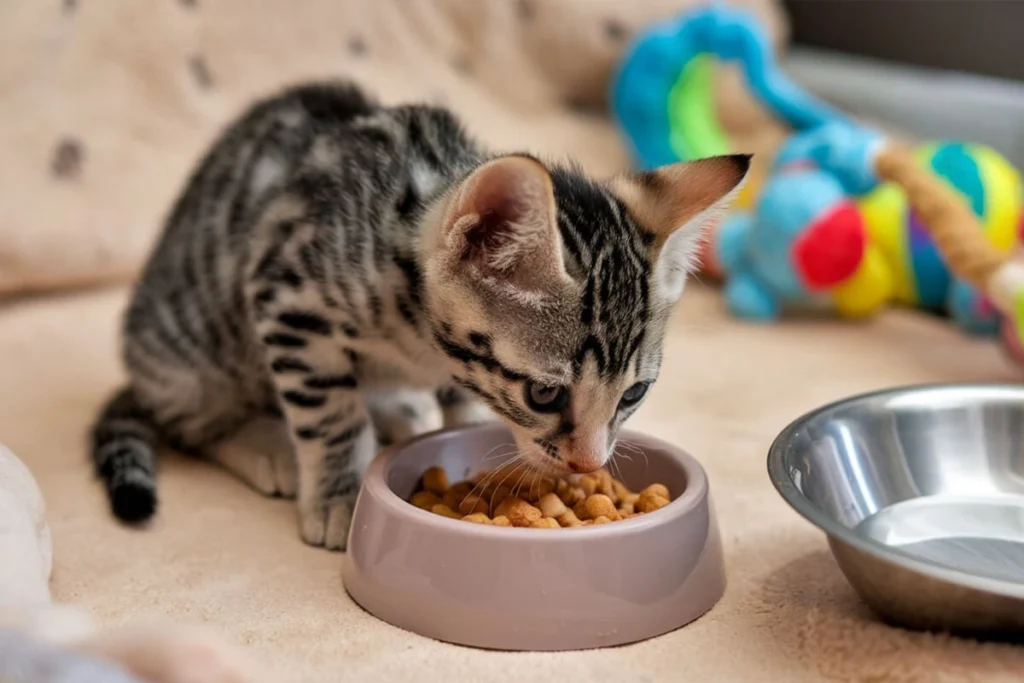
Creating a Safe Space: A Comfortable Haven for Exploration
A baby kitten needs a secure and cozy space to feel comfortable and safe. A designated kitten area provides a sense of security while helping the kitten adjust to its new home. A quiet, enclosed space with soft bedding, a small litter box, food and water bowls, and a few comforting toys creates the perfect environment for a baby kitten to thrive.
Choosing the right location for a kitten’s safe space makes a big difference. A quiet corner of a room, a cozy cat bed, or a small playpen keeps the kitten from feeling overwhelmed. Avoid placing the kitten’s area near loud noises, heavy foot traffic, or other pets that may cause stress. A warm, soft blanket or a heated cat pad mimics the warmth of a mother cat, providing extra comfort.
Baby kittens love to explore, so kitten-proofing the space ensures safety. Securing electrical cords, removing small objects that could be swallowed, and blocking off tight spaces prevent accidents. Providing vertical spaces like a small cat tree or a low scratching post encourages natural climbing instincts while keeping the kitten entertained.
A baby kitten gradually gains confidence as it explores its surroundings. Gentle introductions to other pets and family members, along with positive interactions, help build trust. Offering plenty of reassurance, gentle handling, and patience makes the transition to a new home easier. A well-prepared and secure environment allows a baby kitten to feel safe, happy, and eager to learn.
Choosing the Right Cat Toys: Encouraging Play and Development
Playtime plays a crucial role in a baby kitten’s physical and mental development. The right toys stimulate natural instincts, encourage exercise, and strengthen the bond between kitten and owner. Choosing a variety of safe, engaging toys keeps a kitten entertained while promoting healthy growth.
Interactive toys, such as feather wands and string teasers, provide an excellent way to engage a baby kitten in play. These toys mimic prey movements, satisfying the kitten’s hunting instincts while helping develop coordination and agility. Waving a feather wand or dragging a string along the floor encourages jumping, pouncing, and chasing, all of which contribute to muscle development.
Soft plush toys offer comfort and companionship, especially for young kittens adjusting to a new home. Some kittens carry small stuffed animals in their mouths or cuddle them while sleeping, mimicking the warmth of their littermates. Toys with crinkly textures or gentle sounds capture a kitten’s attention, adding extra excitement to playtime.
Balls and rolling toys keep a kitten entertained for hours. Lightweight balls, especially those with bells or rattles inside, encourage swatting, chasing, and batting—activities that build coordination and keep kittens active. Puzzle toys that dispense treats provide mental stimulation and reward problem-solving skills.
Avoid toys with small, detachable parts that a kitten could swallow. Supervised play ensures safety, especially with string or ribbon toys, which should be put away after playtime to prevent accidental ingestion. Rotating toys keeps playtime exciting and prevents boredom.
The right toys keep a baby kitten happy, engaged, and mentally stimulated. Regular play sessions, combined with interactive and independent toys, provide exercise and enrichment, helping a baby kitten grow into a playful and well-adjusted adult cat.
The Joy of Raising Baby Kittens
Building a Bond with Your Kitten: Creating a Strong Connection
Forming a deep and lasting bond with a baby kitten requires time, patience, and love. Kittens thrive on positive interactions, and every moment spent together strengthens their trust and attachment. Creating a warm and secure environment encourages a kitten to feel comfortable, making bonding easier.
Spending quality time with a baby kitten every day helps establish a close relationship. Gentle petting, soothing words, and soft cuddles reassure a kitten and build confidence. Kittens often respond to affectionate touch by purring, a sign of comfort and happiness. Holding a kitten close, allowing it to snuggle into a warm lap, or stroking its tiny head reinforces feelings of safety and belonging.
Playtime also plays a huge role in bonding. Engaging a baby kitten with interactive toys, such as feather wands, rolling balls, or catnip mice, encourages trust while providing exercise and mental stimulation. Kittens associate play with positive experiences, making them more likely to seek interaction and companionship.
Establishing a routine helps a kitten feel secure. Feeding at consistent times, maintaining regular play sessions, and providing a quiet, cozy space for rest create a predictable and comforting environment. Talking to a baby kitten in a soft, reassuring voice helps it recognize its owner’s presence and feel more connected.
Respecting a kitten’s boundaries strengthens trust. Some kittens warm up quickly, while others take more time to feel comfortable. Allowing a kitten to approach at its own pace and rewarding curiosity with gentle affection builds confidence. A strong bond forms when a kitten feels loved, secure, and understood.
Kitten Socialization Tips: Helping Your Kitten Grow Confident
Socializing a baby kitten properly ensures it grows into a friendly, well-adjusted cat. Early socialization helps kittens feel comfortable around people, other animals, and new environments. Positive experiences during the first few months of life shape their behavior and confidence for years to come.
Handling a baby kitten gently from an early age helps it become comfortable with human touch. Picking up the kitten for short periods, petting different parts of its body, and softly stroking its paws and ears prepare it for future grooming and veterinary visits. Offering treats or affectionate praise while handling reinforces positive associations.
Introducing a kitten to new sights, sounds, and experiences in a calm and controlled way prevents fearfulness. Letting a kitten explore different textures, hear household noises like a vacuum at a low volume, or experience gentle interactions with new people helps it adapt to changes with ease.
If other pets live in the home, introducing them gradually ensures a smooth transition. Using scent-swapping techniques, such as placing a kitten’s blanket near another pet, helps both animals get used to each other’s presence. Allowing supervised meetings in a neutral space while rewarding calm behavior encourages positive interactions.
Encouraging playful social interactions with people strengthens confidence. Letting friends and family members gently interact with a baby kitten, offering treats, or engaging in play teaches the kitten that humans are safe and friendly. Socialization should always be a positive experience, free from force or overwhelming situations.
By providing loving and consistent socialization, a baby kitten grows into a well-mannered, affectionate, and confident cat. Kittens that feel safe and comfortable around people and other pets develop into happy companions who enjoy interacting with their human families.
The Lifelong Impact of Early Care: Setting the Foundation for a Happy Cat
The care and attention a baby kitten receives in its first few months shape its future health, behavior, and personality. A well-socialized, well-nourished, and loved kitten grows into a secure and affectionate cat that forms strong bonds with its human family.
Proper nutrition during kittenhood supports lifelong health. High-quality food, regular hydration, and essential vitamins contribute to strong bones, healthy fur, and a well-functioning immune system. A kitten that receives balanced nutrition has more energy for play, exploration, and development.
Early veterinary care ensures long-term well-being. Vaccinations, deworming, and routine health checks prevent serious illnesses and promote a healthy start in life. A kitten that experiences gentle handling during vet visits becomes more comfortable with medical care as it grows.
The emotional and social care a baby kitten receives impacts its personality as an adult. Kittens raised in a loving, secure environment develop into confident and affectionate cats who seek human companionship. Those who receive positive reinforcement, gentle handling, and social interaction become more trusting and well-adjusted.
The time and effort spent caring for a baby kitten create a lifelong bond filled with love and companionship. Every cuddle, play session, and gentle word helps shape a kitten into a happy, affectionate, and well-behaved cat. By providing the right care from the start, kitten owners ensure their feline friends enjoy a lifetime of health, happiness, and unconditional love.
Conclusion
Raising a baby kitten is an incredibly rewarding experience that brings joy, companionship, and unconditional love. Every tiny paw step, soft purr, and playful bounce creates lasting memories, making the effort of nurturing a kitten worthwhile. Understanding a kitten’s needs and providing proper care ensures it grows into a healthy, affectionate, and well-adjusted cat.
From the moment a kitten enters the world, its early weeks shape its future. A strong foundation of nutrition, socialization, and love builds confidence and trust. Ensuring a kitten receives high-quality food, regular veterinary check-ups, and a secure environment supports its physical and emotional well-being. Playtime, cuddles, and gentle training strengthen the bond between kitten and owner, turning a small, curious ball of fur into a lifelong companion.
Every interaction with a baby kitten influences its growth and personality. Providing safe exploration spaces, introducing new experiences positively, and respecting a kitten’s unique temperament help shape a well-mannered and friendly adult cat. The more time and love invested in early care, the stronger the bond becomes.
The irresistible charm of baby kittens lies in their innocence, curiosity, and boundless energy. Their tiny paws, expressive eyes, and gentle purring capture hearts instantly. Raising a kitten requires patience, responsibility, and dedication, but the love and companionship they give in return make every effort meaningful.
Caring for a baby kitten is not just about feeding and playing—it’s about building trust, providing security, and shaping a lifelong friendship. Every kitten deserves a loving home, and with proper care, that tiny, playful bundle grows into a happy, affectionate cat that brings endless joy for years to come.
Discover the Top Differences of Kittens vs puppies Here.
Read More About Pets and Breeds From Here.
You Can Find Some Good stuff for your Furry Cat on Pet MD Official.
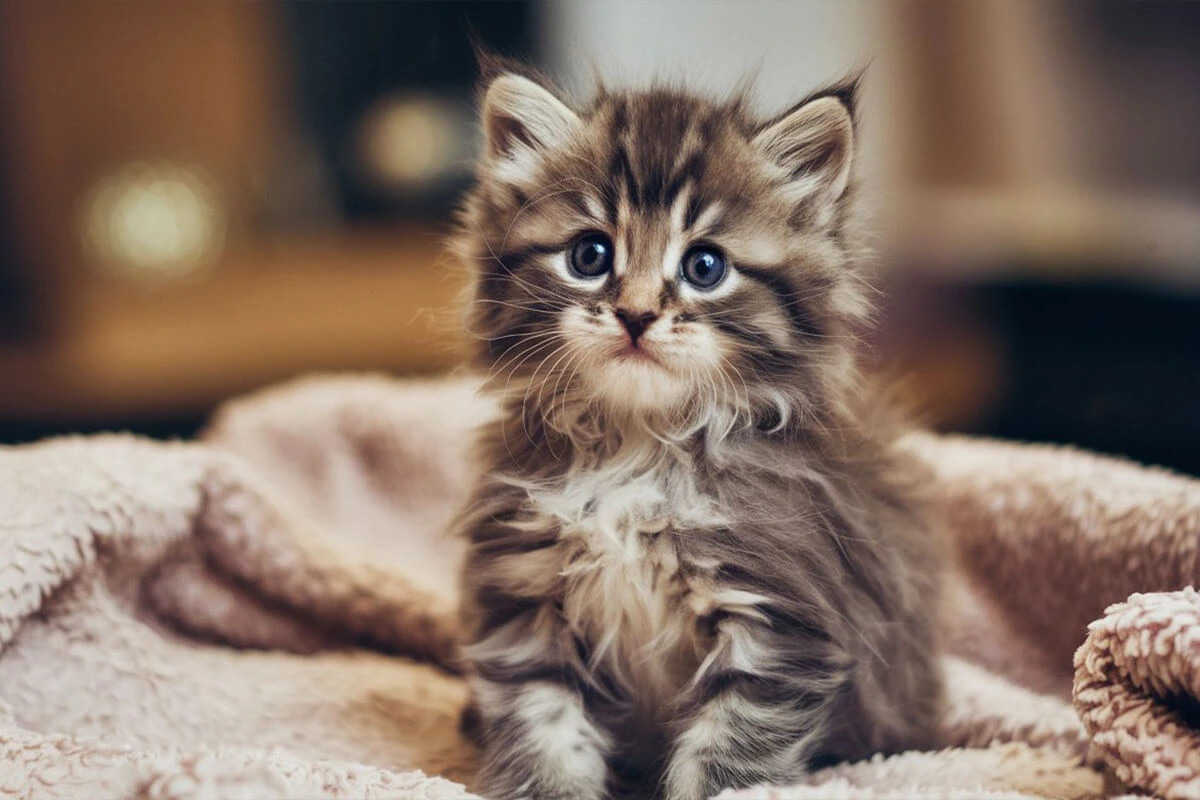
1 thought on “What Makes Baby Kittens So Irresistibly Cute? Experts care tips”
Comments are closed.